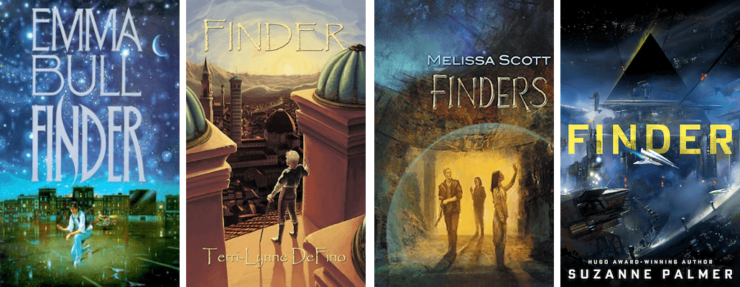It’s only natural to sort books into sets, just as we all meticulously sort our M&Ms by color so that we can consume them in the correct order. Sometimes it’s obvious why one categorizes as one does. At other times, as with the following books, one has a nearly subconscious sense that somehow these works share something…without quite being able to articulate what that something is.
Emma Bull’s 1994 young adult novel Finder is an interesting example of the potential of shared universes. Some shared universes specialize in producing endless commercial product—narrative sausage, any length of which is indistinguishable from another. Not so with the Borderlands series. The various works share a common setting, a liminal realm where both magic and technology are unreliable, but the books otherwise stand on their own. Orient’s ability to track down any object with which he has a relationship offers a logical path to a livelihood, but it also makes Orient a pawn in the struggle to find the source of a deadly drug.
Terri-Lynne DeFino’s 2010 secondary-universe fantasy Finder focuses on Ethan, who shares with Bull’s Orient the ability to find things. Ethan can find people as well as objects, which makes him the natural person to dispatch on the trail of escaped slave Zihariel. The plan is for Ethan to track down and deliver Zihariel back to her owner, in return for which Ethan will be rewarded with glorious fortune. What happens when the two meet muddles the plan.
Melissa Scott’s 2018 archaeological science fantasy Finders is set after the collapse of not one but two civilizations commanding technologies only poorly understood by their descendants. For Cassilde Sam and her partner Dai Winter, tracking down the Ancestors’ relics provides a meagre livelihood. The sudden reappearance of their estranged former partner Summerlad Ashe brings with it the potential of a treasure that could make them all rich, and possibly even cure Cassilde’s terminal illness. But only if they can survive pursuit from a murderous fellow who is hunting for Summerlad and the Ancestors’ treasure.
Suzanne Palmer’s 2019 space opera Finder sees repo man Fergus Ferguson dispatched to recover a starship whose current possessor did not submit to the trifling formality of actually paying for the vessel. Fergus’ arrival coincides with the outbreak of a system-wide civil war, which is bad enough. Far worse is the appearance of enigmatic, god-like aliens, beings of untold power who take an all-too-personal interest in the increasingly alarmed Fergus….
Different genres, products of different eras, entirely disparate narrative strategies; each of these four books is unique. Yet somehow I am left with the sense that they share something important. What that something might be I cannot say. Perhaps I will never know.
In the words of Wikipedia editor TexasAndroid, prolific book reviewer and perennial Darwin Award nominee James Davis Nicoll is of “questionable notability.” His work has appeared in Publishers Weekly and Romantic Times as well as on his own websites, James Nicoll Reviews and Young People Read Old SFF (where he is assisted by editor Karen Lofstrom and web person Adrienne L. Travis). He is surprisingly flammable.










